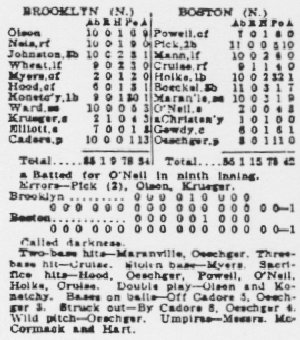The Times game story begins:
The Robins and the Braves celebrated May Day in this ordinarily peaceful city by staging a prolonged, heart-breaking struggle for twenty-six innings at Braves Field and bombing to bits all major league records for duration of hostilities. When darkness threw its mantle over the scene, forbidding further battling, both teams were still on their feet, interlocked in a death clutch and each praying for just one more inning in which to get in the knockout blow.The linescore of the game -- played 84 years ago today -- was so long that it had to be broken up into two lines for each team. Here it is:
As far as results in the chase for the pennant go the game was without effect, for the final score was 1 to 1. In the matter of thrills, however, the oldest living man can remember nothing like it, nor can he find anything in his granddad's diary worthy of comparison. Heart disease was the mildest complaint that grasped the spectators as they watched inning after inning slip away and the row of ciphers on the scoreboard begin to slide over the fence and reach out into the Fenway.

Played in a crisp 3:50, the game set a new record for innings. The previous mark had been 24 innings, set on September 1, 1906 between the Red Sox and the Philadelphia A's. The National League record was 22 innings, set by Brooklyn and Pittsburgh on August 22, 1917.
Both starting pitchers -- Brooklyn's Leon Cadore and Boston's Joe Osechger -- went the distance! (In that 24-inning contest, Philadelphia's Jack Coombs and Boston's Joe Harris also threw complete games.) Cadore estimated that he threw "at least 300 curves." He could not lift his arm to comb his hair for three days afterwards and did not pitch for eight days.
Osechger threw mostly fastballs and when he talked about the game in 1970, he said he didn't think he threw more than 250 pitches. He usually threw only about six warm-up pitches, but after about the 12th inning, he began throwing only a couple. Oeschger also ended up on the bench for a week, but that was because he pulled a leg muscle running sprints the next day. (Almost exactly one year earlier -- on April 30, 1919 -- he pitched a 9-9, 20-inning tie for the Phillies.)
The box is a little blurry, but the #2 batter for Boston, Charlie Pick, went 0-11.
Check this out:
Saturday, May 1, 1920
Brooklyn 000 010 000 000 000 000 000 000 00 - 1 9 2 Boston 000 001 000 000 000 000 000 000 00 - 1 15 2Sunday, May 2, 1920
Phillies 001 000 200 000 1 - 4 9 1 Brooklyn 000 000 201 000 0 - 3 6 4Monday, May 3, 1920
Brooklyn 000 010 000 000 000 000 0 - 1 12 1 Boston 000 001 000 000 000 000 1 - 2 13 2Did Brooklyn have the worst three-day weekend in the history of baseball? After the 26-inning tie on Saturday, Brooklyn took a midnight train back to New York. On Sunday, they played 13 innings and lost to the Phillies. They took another overnight train back to Boston and played the Braves again on Monday, this time losing in 19 innings.
In three days, Brooklyn played 58 innings of baseball, scored only 5 runs and didn't win anything.
Brooklyn set a record for most innings played in 3 consecutive games (58) and Boston set a record for the most innings played in 2 consecutive games with 45 (May 1 and 3, 1920; they had Sunday off).
In August 1989, Laura and I saw the Dodgers beat the Expos in Montreal 1-0 in 22 innings. While the game did not go the 27 innings (or more) that I was hoping for, it did set a record as the longest extra-inning 1-0 night game and the longest extra-inning 1-0 game by time: 6:14. It is also the longest game in Expos history. ... I have been to 19 major league ballparks and this game remains the best game I have ever seen in person. ... I would love for that to change this October. It would only take 9 innings.
No comments:
Post a Comment